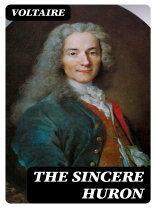In his thought-provoking novella, ‘The Sincere Huron, ‘ Voltaire weaves a narrative that intimately explores themes of cultural relativism, hypocrisy, and the essence of sincerity. This brief but impactful work employs a distinctly satirical literary style, characteristic of Voltaire’s oeuvre, blending wit and introspection in a way that critiques European society while simultaneously celebrating the innocence and moral clarity of indigenous life. Set against the backdrop of the Enlightenment, the work reflects the philosophical currents of its time, particularly the tension between reason and superstition. Voltaire, a prominent figure of the Enlightenment, was deeply influenced by his travels and the diverse cultures he encountered. His desire to challenge the status quo and advocate for human rights permeated his writings. ‘The Sincere Huron’ serves as a vessel through which he articulates his disdain for the dogmas that pervade both religion and societal norms, drawing on his own experiences and sharp intellect to deliver a compelling critique of contemporary civilization. Readers seeking a blend of humor and earnestness, along with rich philosophical insights, will find ‘The Sincere Huron’ to be a captivating read. Voltaire’s adept storytelling not only engages but also provokes critical reflection on the nature of humanity, making this novella a timeless piece worthy of exploration for anyone interested in Enlightenment thought and satire.
Mengenai Pengarang
François-Marie Arouet, known by his nom de plume Voltaire, was a towering figure of the French Enlightenment, a period marked by intellectual ferment and the promotion of secular values and freedoms. Voltaire (1694–1778) was a prolific writer, philosopher, and wit, whose oeuvre spans plays, poems, novels, essays, historical and scientific works, over 21, 000 letters, and more than two thousand books and pamphlets. Among his most celebrated works is ‘Candide, ou l’Optimisme’ (1759), a satirical novella that critiques the optimistic philosophies of the day through the tribulations of its protagonist. Voltaire’s ‘The Sincere Huron’ (French: ‘L’Ingénu’, 1767) follows this satirical tradition, presenting the story of a naive Huron called ‘Child of Nature’ who navigates French society with a mix of innocence and critical insight, laying bare its hypocrisies and injustices. Voltaire’s mastery lay in his incisive use of wit to question established norms and to advocate for tolerance, freedom of speech, and separation of church and state. Renowned for his advocacy for civil liberties, his literary style combined sharp satire with elegance, making him one of France’s greatest writers and a preeminent figure of Enlightenment thought. His works have profoundly influenced Western philosophy and literature.












